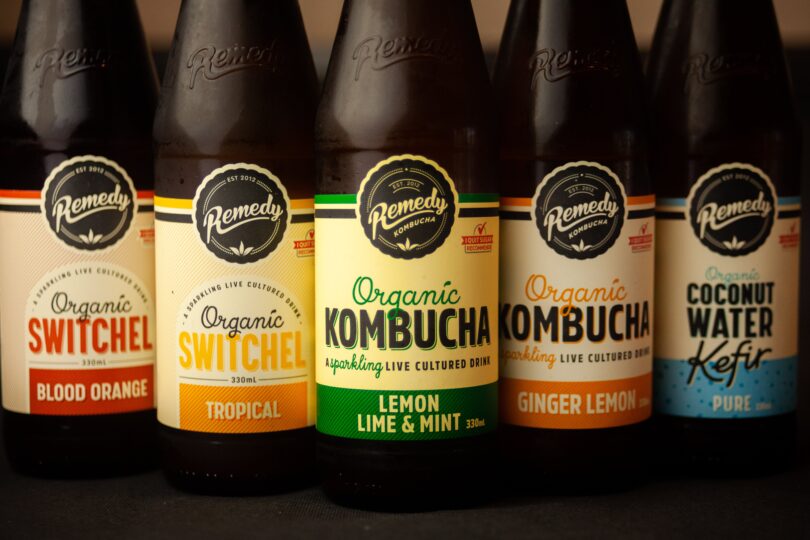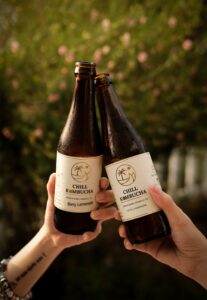In recent years, Kombucha has surged in popularity as a health-conscious beverage, celebrated for its probiotic-rich composition and potential health benefits. However, for those who adhere to specific dietary guidelines, particularly in the context of halal dietary practices, the question arise – is Kombucha halal, or is it forbidden due to its fermentation process?
In this article, we will reveal the critical differences between Kombucha and alcohol, is Kombucha halal and offer clarity on its consumption within Islamic dietary guidelines.
Table of Contents
What is Kombucha?
Imagine you have a sweet, slightly sour, fizzy drink made from tea. Now, add some healthy bacteria and yeast, and let them hang out together for a while. You have Kombucha!
It’s like a magic trick, but instead of making something disappear, it makes something new and good for you. The bacteria and yeast eat the sugar and create probiotics, tiny friends that help your tummy feel happy and healthy.
So, Kombucha is basically tea that gets bubbly and gives your gut a high five!
Fermentation process – Alcohol vs. Kochumba
Both alcohol and Kombucha are fermented beverages, but their processes and end products differ. Let’s break it down:
Similarities:
- Starting point: Both start with a sugary liquid, often tea for Kombucha and sugary wort for alcohol.
- Microbes: Both involve fermentation by microorganisms.
- Byproducts: Both produce carbon dioxide (CO2), creating a fizzy texture.
Differences:
- Alcohol: Uses specific yeast strains like Saccharomyces cerevisiae to convert sugars primarily to ethanol (alcohol).
- Kombucha: Uses a SCOBY (Symbiotic Culture of Bacteria and Yeast) containing various bacteria and yeast strains. Bacteria convert sugars to acids like acetic and gluconic acids, while yeast converts some sugars to ethanol.
End product:
- Alcohol: High alcohol content, typically 5-15% by volume, and little to no residual sugar.
- Kombucha: Low alcohol content, typically less than 0.5% by volume, retains some sugar for a slightly sweet taste.
| Feature | Alcohol | Kombucha |
| Microbes | Specific yeast strains for ethanol production | SCOBY with diverse bacteria and yeast strains |
| Main byproduct | Ethanol (alcohol) | Acids (acetic, gluconic) and some ethanol |
| Alcohol content | High (>5% by volume) | Low (<0.5% by volume) |
| Residual sugar | Low or negligible | Some sugar remains for sweetness |
| Process control | Precise temperature and time control necessary | More flexible fermentation time |
| Purpose | Intoxication | Potential health benefits |
Ingredients in Kochumba
To thoroughly understand is Kochumba halal we must understand the ingredients it contain. So, here are the details.
Tea
The type of tea used for Kombucha can affect the flavor and acidity of the finished product. Black tea is the most commonly used tea, with a strong flavor and high tannin content. Green tea and herbal teas can also be used, but they will produce a lighter-flavored Kombucha.
Sugar
The amount of sugar used in Kombucha can also affect the flavor and acidity of the finished product. More sugar will produce a sweeter and less acidic Kombucha. Less sugar will make Kombucha more tart and sour.
SCOBY
The SCOBY is a living culture that is essential for the fermentation process. It is a gelatinous mat that contains a variety of bacteria and yeast. The SCOBY is what gives Kombucha its characteristic fizziness and tangy flavor.
Flavorings
Fruits, herbs, and spices can be added to Kombucha to enhance its flavor. These flavorings can be added before or after fermentation. If added before fermentation, the flavors will be more pronounced. If added after fermentation, the flavors will be more subtle.
Here are some common fruits, herbs, and spices that can be used to flavor Kombucha:
- Fruits: Grapefruit, lemon, lime, raspberry, blueberry, strawberry, peach, etc.
- Herbs: Ginger, mint, lavender, rosemary, thyme, etc.
- Spices: Cinnamon, nutmeg, cardamom, cloves, etc.
Is Kombucha halal?
Is Kombucha halal is a matter of interpretation and religious guidance. It naturally contains a small amount of alcohol as a byproduct of fermentation, which is a point of contention. Some Islamic scholars argue that even a tiny amount of alcohol is haram, while others consider it permissible due to its natural occurrence and low levels.
If you follow strict halal guidelines, please consult with trusted religious scholars and consider your beliefs and practices when deciding.
Is Kombucha halal Shia?
There is no single, universally accepted opinion.
- Grand Ayatollah Sistani: Considers Kombucha not halal due to its alcohol content.
- Other Shia scholars: Some consider Kombucha permissible if the alcohol content is below a certain threshold, such as 0.5%
Is Kombucha halal Sunni?
The halal status of Kombucha is debated among Muslims as well.
- Hanafi: Considers Kombucha permissible if the alcohol content is below 0.5%.
- Shafi’i: Believes Kombucha haram due to its alcohol content, regardless of the amount.
- Maliki: Some Maliki scholars consider Kombucha permissible if the alcohol content is below 0.5%.
- Hanbali: Consider Kombucha haram due to its alcohol content, regardless of the amount.
Please note that these are just general trends, and individual scholars may have different opinions.
What Kombucha products are halal certified?
Here are some Kombucha products that are halal certified:
Globally:
- Remedy Kombucha: All flavors are certified halal by the Al-Iman Islamic Society.
Regionally:
- CHACHA Kombucha (Malaysia): Certified halal by JAKIM Malaysia.
- Remedy Kombucha (Australia): Certified halal by Halal Australia.
- Kombrewcha (Indonesia): Certified halal by LPPOM MUI.
- Rise Kombucha (USA): Certified halal by Islamic Services of America (ISA).
Other Brands:
- GT’s Kombucha: Though not officially certified, the company has stated that its Kombucha contains less than 0.5% alcohol and is therefore considered halal by many Islamic scholars.
- Brew Dr. Kombucha: Similar to GT’s, Brew Dr. Kombucha also states that their product has less than 0.5% alcohol and considers it halal.
- Health-Ade Kombucha: Another brand stating less than 0.5% alcohol and a halal consideration for many.
The list is not exhaustive, and new halal-certified Kombucha products may be available. It’s always best to check the individual product label for halal certification or contact the manufacturer directly for their specific halal status.
Similar Kombucha halal alternatives
Since Kombucha might not be suitable for everyone due to its alcohol content, here are some similar halal alternatives:
Kefir
Kefir is a fermented drink made with kefir grains, a mixture of bacteria and yeast. It has a similar tangy flavor to Kombucha and is also rich in probiotics, which are beneficial for gut health. Kefir is generally considered halal, as the alcohol content is typically less than 0.5%.
Kvass
Kvass is a fermented drink made from rye bread. It has a slightly sweet and sour flavor and is a good source of B vitamins. Kvass is traditionally consumed in Eastern Europe and is considered halal, as the alcohol content is usually around 1%.
Doogh
Doogh is a yogurt-based drink popular in the Middle East and Central Asia. It has a savory and slightly salty flavor and is often made with herbs, spices, and vegetables. Doogh is non-alcoholic and considered halal.
Ayran
Ayran is a yogurt-based drink similar to Doogh, but it is thinner in consistency and has a slightly sour taste. It is popular in Turkey and other Central Asian countries and is considered halal.
Jallab
Jallab is a sweet and refreshing drink made from carob molasses, grape juice, and rose water. It is popular in the Middle East and is considered halal.
Jun
Fermented tea drink is similar to Kombucha but made with honey instead of sugar, resulting in a slightly different flavor profile. It’s considered halal by most scholars due to its low alcohol content.
Apple cider vinegar (ACV)
Diluted ACV with water and honey offers a similar tartness to Kombucha. It’s considered halal and has various health benefits.
Sparkling herbal teas
Various herbal tea blends offer a refreshing, bubbly experience similar to Kombucha. Look for caffeine-free options for a closer match.
Conclusion
Is Kombucha halal depends on interpretation. It has a bit of alcohol from fermentation. Shia scholars like Grand Ayatollah Sistani usually say it’s not halal. Among Sunni scholars, opinions vary by school. Some may allow it if alcohol is under 0.5%, while others may consider it haram.
If you want halal Kombucha, some brands like Remedy, CHACHA, Kombrewcha, Rise, GT’s, Brew Dr., and Health-Ade have sought halal certification. Always check labels or ask the manufacturer.
If you’re unsure or prefer alternatives, consider drinks like Kefir, Kvass, Doogh, Ayran, or Jallab, generally regarded as halal.
FAQs
1. Do Muslims drink Kombucha?
Yes, some Muslims drink non-alcoholic Kombucha.
2. Is Kombucha halal certified?
No, it’s not generally certified.
3. Is 0.5 alcohol kombucha halal?
Opinions differ; consult your religious scholar.
4. Is there any alcohol in Kombucha?
Yes, a small amount (<1%).
5. Who Cannot drink Kombucha?
People with compromised immune systems, pregnant/breastfeeding women, specific medical conditions, and children.
6. Can you drink Kombucha during Ramadan?
It differ for every individual. Please consult your religious scholar.
7. Can I drink Kombucha every day?
Yes, but moderation is key.
8. Can kids drink Kombucha?
No the drink not recommended for kids.
9. What are the side effects of Kombucha?
Bloating, gas, nausea, headaches, diarrhea, and allergic reactions in some.
10. What does Kombucha taste like?
Slightly sweet and tart, with variations by brand and ingredients.



indianpharmacy com http://indiaph24.store/# ?»?legitimate online pharmacies india
online pharmacy india